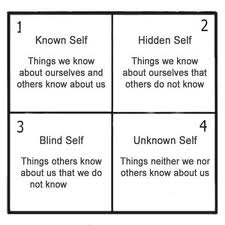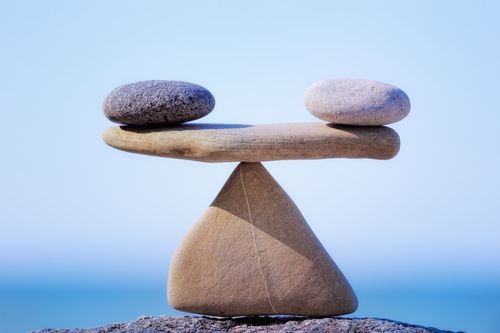By LeAnna J. Carey | Oct 31, 2011

Every human has four endowments- self awareness, conscience, independent will and creative imagination. These give us the ultimate human freedom... The power to choose, to respond, to change, Stephen Covey
Do your day-to-day decisions match what you want for your life? To achieve your best personal health, begin by exploring what blind spots you may have about lifestyle habits that don’t enrich to your health, and ask yourself “what can I do differently?”
Most of us have friends or family where we are accountable for our actions, and lifestyle decisions can be included in those discussions, as well. I began to think about Charles Handy's concept of the Johari window in relationship to self-care health and lifestyle decisions. His four room concept is about self-awareness. Room 1 is the part of ourselves that we see and others see. Room 3 contains the aspects that others see but we are not aware of. Room 4 is the most mysterious room in that the unconscious or subconscious part of us is seen by neither ourselves nor others. Room 2 is our private space, which we know but keep from others. In other words, are you open to looking at yourself from a different perspective? This foundational action is key to embracing the lifestyle habits that benefit your health and that match the life you want to create. Opening up oneself and acknowledging that we are our own unique gatekeeper when it comes to our lifestyle choices is empowering.
The next step toward being self aware and empowered is understanding the basics of managing your energy. The three pillars of what keeps our body rhythms in sync and optimizes our energy are:
-
Sleep
-
Timing
-
Light
What ties everything together is making the right decisions about how we get our day-to-day lifestyle habits in sync with our need for energy and rest. For instance, make a conscious decision to turn off the electronics (light) a couple of hours before bedtime (timing); you'll enhance optimal renewal (sleep) → you are more likely to consume the right amount of calories → more likely to have energy → more likely to have a productive work day and home life → more likely to be empowered and self-aware. Getting our body rhythms in sync increases our self-awareness and opens up creative potential in our lives. What is most important is embracing positive moment-to-moment decisions that enrich your health and your life. As Steven Covey has described, we have the power to choose, respond and change.
By LeAnna J. Carey | Sep 23, 2011

Thomas Dekker said that “sleep is the golden chain that ties health and our bodies together.” Most of us would agree that we feel at the top of our game after a good night’s rest and feel less than competitive after a restless night. One third of each day is spent sleeping and a new epidemiology study reports that there has been a decline in sleep over the past several decades by 1.5 to 2 hours, with close to one third of adults reporting they sleep less than 6 hours per night. The news does not get any better, as other research shows that short sleep duration may be a potential risk factor for newly diagnosed type 2 diabetes.
So what does this mean for the everyday person who needs to stay competitive in the market place and still have energy for family, friends and self? First of all, recognize that people are living and working longer. It is time to start thinking about personal energy and productivity, because employers are looking into ways to maintain high performing work places. This past June, Representatives Klobuchar and Paulsen announced the creation of a congressional caucus that will focus on ways for companies to support employee health and wellness. These initiatives are a positive move that will bring the impact of lifestyle health decisions to a greater level of awareness. Health decisions, however, are personal and making a commitment for healthier lifestyle choices is an effective starting place.
The obvious choices are to use less alcohol, tobacco, be more active and choose a healthier diet, but there are less obvious changes to make – like understanding your circadian rhythm and what will tip the scale to keep you unbalanced and less productive. Your body is composed of many internal “clocks” that stay in rhythm with light and dark, hot and cold, and activity and rest. Here are some tips on how to create more energy and a more productive day:
-
Be physically active in the late afternoon. If you exercise first thing in the morning, your heart works harder in order to send more blood to the skin to meet the core body’s demand to be cooler. That’s why most adults have a peak stamina time is in the late afternoon.
-
If you have difficulty transitioning from sleep to wakefulness, sunlight helps, but when that is impossible, use bright interior lights that give off at least 400-800 lumen.
-
Your body anticipates a substantial food boost shortly after waking, and this is key to synchronizing the cortisol rhythm to wakefulness. Try eating 25-35% of your total daily calories at breakfast – this helps coordinate your cortisol rhythm, gives you more opportunity to burn them off and allows you to eat a smaller dinner.
Try these tips and you will see an improvement in starting out your day with more energy. “Well-spent day brings happy sleep,” Leonardo da Vinci
By LeAnna J. Carey | Aug 19, 2011

John Quincy Adams said, "If your actions inspire others to dream more, learn more, do more and become more, you are a leader." I thought of this historical quote today after reading an insightful article in Smartbrief on Rajeev Peshawar, the CEO of the ICLIF Leadership and Governance Centre, and the author of "Too Many Bosses, Too Few Leaders" when he was quoted, "we spend a huge amount of time and money trying to teach something that cannot be taught. True leadership is about having the lasting energy to create a better future-that's not something that you learn in a classroom or training module." He continues by saying that the first step of a leader is to "discover their personal source of energy ... then align the energy of others toward a shared purpose."
These are wise words, simple and understandable. When I think of true leaders, I don't necessarily picture all the trappings, rather their ability to think and to do so beyond their own perspective. Today, we encounter complexities that did not exist two years ago, and as a result, work life balance has taken on a whole new meaning. To stay on top of their industries, leaders, especially today, need to be able to think clearly and the challenge is finding the time, energy, and flexibility.
Consider looking at the time that is available to you and match it up against your goals. You will feel more in control of your life if you identify goals that are not progressing, apply some flexibility, and consider what might be more personally satisfying. Yes, alternate goals - like more balance in your schedule. The current economic environment seems willing to stay and linger for a bit; we can't control that, but we can control how we respond to these complexities. We can start by carving out time to think!


